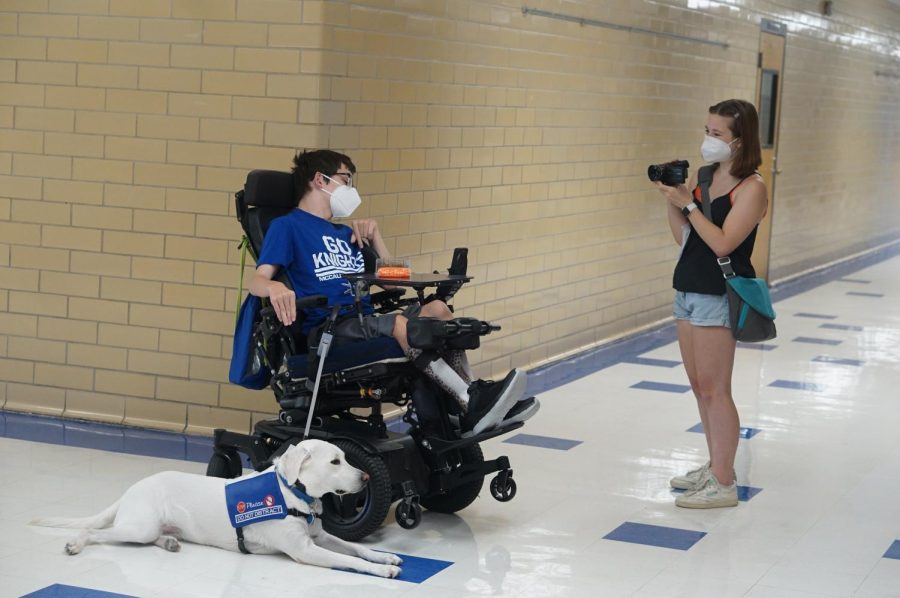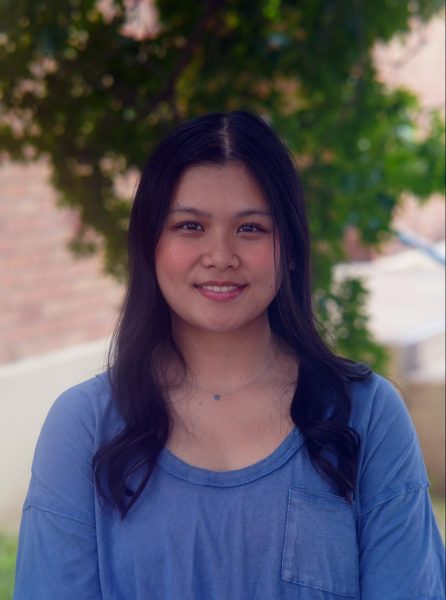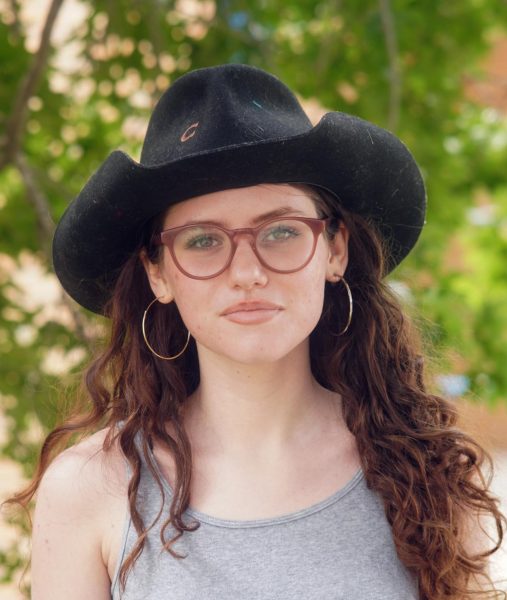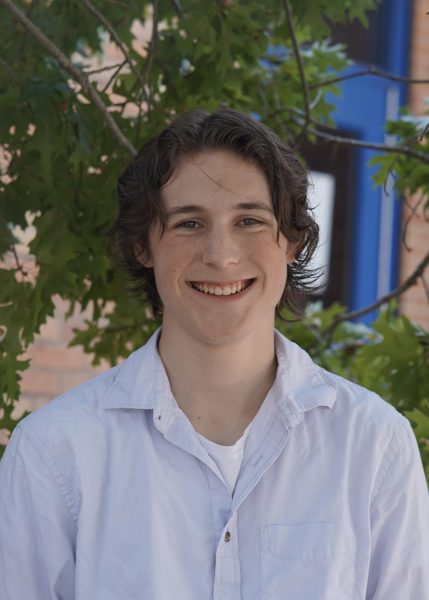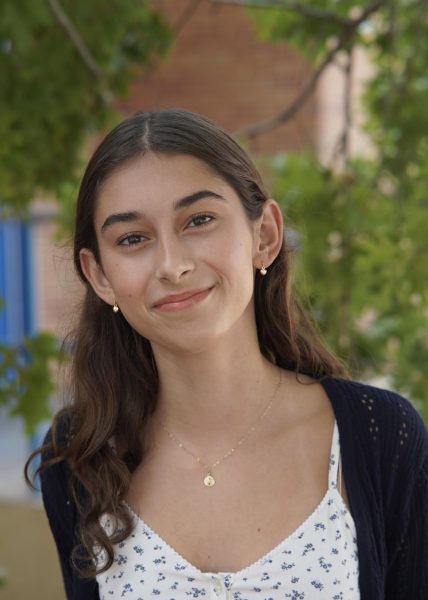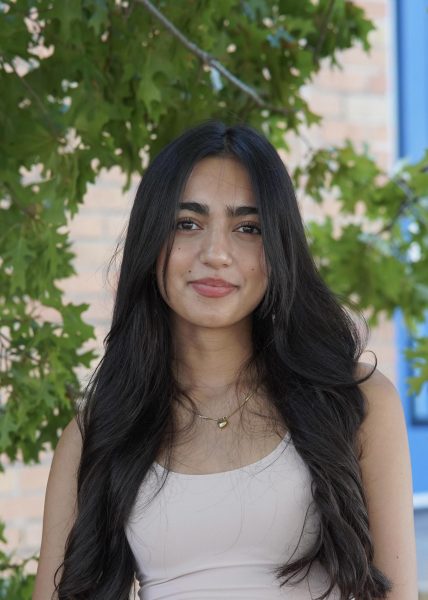Alice Scott: NSPA Broadcast Journalist of the Year portfolio
Sophomore Alice Scott interviews freshman Ben Polega who brought his service dog Friday to school on Aug. 16. The broadcast feature package that came from this interview, “Thank God it’s Friday,” won first place at the fall National Scholastic Press Association Best of Show competition, marking the first time that MacJournalism has earned a Best of Show Award in broadcast journalism.
I never intended to go into journalism. As a kid, I wasn’t particularly gifted in writing and had little motivation towards academic pursuits.
What I wanted to do was theatre. After a stellar performance as Toto in The Wizard of Oz in my second-grade school musical, I was certain that my destiny would play out on stage.
Despite my certainty in this career path, it may have been hasty to plan out the rest of my life at age 7. Because if I’ve learned anything in the nine years since my theatrical debut, it’s that not everything goes as planned.
The summer before sixth grade, at 11 years old, I attended the Gloria Shields NSPA Media Workshop. Instead of tagging along with my mom, the journalism adviser at my middle school, I enrolled in beginning videography with Jim McCarthy. Armed with an iPad and a borrowed laptop, I learned alongside students who were a minimum of four years older than me, and easily more than a foot taller. 72 hours later, I was hooked.
Fast forward five years, and I’m the broadcast veteran on my newspaper staff, The Shield at McCallum High School. Seven-year-old me never would have guessed it, but I had adapted and grown as my interests changed — valuable skills that were pivotal in my production of broadcast news stories this year.
In June 2021, I was chosen as the online-co-editor-in-chief of the Shield staff which put me in an opportune position when it came to making videos. In this position, I’ve diversified multimedia coverage on our online website, but even more rewarding — I’ve taught others on staff about broadcast journalism.
In a year where nothing went as planned, from ever-evolving school district policies to teacher and substitute shortages, school often felt up in the air. Being able to produce objective and meaningful news for my school community reminded me of the power of journalism to inform, support and inspire.
In many of my videos I worked with another staff member as a mentor to teach them about the technical execution and reporting differences in broadcast journalism. I gave a presentation to fellow staffers about how to make broadcast stories and worked one-on-one with my peers to help diversify both our coverage of events and talents on staff.
Of course, this growth wasn’t without a few setbacks. I had to learn to let go of total control. Instead of staying up until 2 a.m. editing footage until the perfectionist in me was satisfied, I had to be OK with letting others take the reigns.
It wasn’t easy, but it was incredibly gratifying. Because as my peers learned from me, I learned from them. I’ve become a better editor and a better teacher, which I know will continue to benefit me for years to come.
The 2022-23 school year was my first in-person year of high school and my first in-person year on our news staff. After a year and a half of Zoom interviews and subject-submitted b-roll, I was excited to return to a sense of normalcy. Of course, jumping back in had its obstacles like remembering the process of covering events and conducting on-site interviews — but the reward was found in getting to tell stories and working with new people.
My work as online co-editor-in-chief was all about lessons learned. In a year where nothing went as planned, from ever-evolving school district policies to teacher and substitute shortages, school often felt up in the air. Being able to produce objective and meaningful news for my school community reminded me of the power of journalism to inform, support and inspire.
Supporting Trans Teens
I produced this story about two transgender teens — Jake Waggoner and Wednesday Gomez — during the PBS Student Reporting Labs Summer Broadcast Academy. Creating this video allowed me to produce localized coverage during a national debate over trans rights for high school students as it was playing out in the Texas legislature. This story gave visibility to Jake and Wednesday’s experience, showcased how families can support trans youth and provided a face to a heavily politicized issue.
Thank God it’s Friday
This was the first video I created this school year, starring two of my most personable subjects yet, Ben Polega and his service dog, Friday. Ben’s story reminded me of why I love journalism — it allows me to tell stories about people who do amazing things, people who have persevered through life’s challenges. My skills as a reporter were reinvigorated in this piece, but even more importantly, my skills as an in-person broadcast journalist.
Drop in COVID risk factor brings pep rallies back to Mac
This video commemorated the first pep rally at McCallum since the pandemic started in 2020 and marked my first live event coverage in almost two years. It reminded me of how challenging it can be to rely solely on b-roll from one event, instead of being able to revisit locations to get additional footage in the event of poor video quality or when there weren’t enough shots. As I continued to uncover aspects of broadcast that were lost during my time in online school, I gained an appreciation for on-location journalism.
Coffeehouse makes a comeback
This story covered the return of a favorite McCallum tradition — Coffeehouse — an in-school performance venue where students perform original songs, poetry and other written works. I worked with two other staff members, to teach them how to write and record voiceovers, as well as how to shoot b-roll. Because I was able to share more responsibilities with my peers, my primary role was as editor, which allowed me to focus on a specific set of skills and experiment with new techniques and timing.
A new normal for elementary schools
During the middle of the second semester, I felt a slump in both my academic performance and my work on staff. I credited it to my first full year back at school, which got me wondering: How are younger kids adjusting to school? To find out, I interviewed a family from my former elementary school, about their COVID learning experience, as well as the school’s principal, to focus on a niche subject that still resonated with many students and parents.



